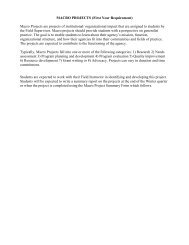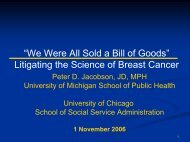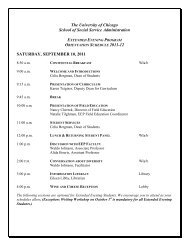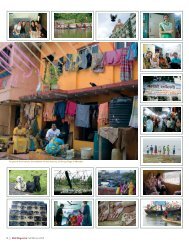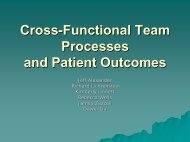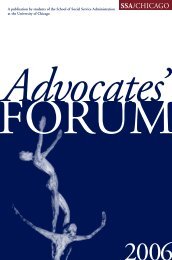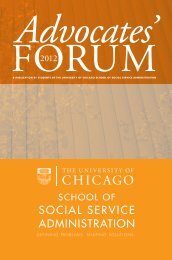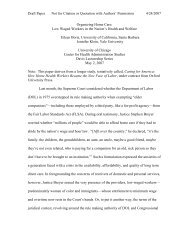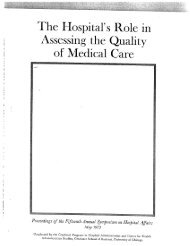2004 - School of Social Service Administration - University of Chicago
2004 - School of Social Service Administration - University of Chicago
2004 - School of Social Service Administration - University of Chicago
Create successful ePaper yourself
Turn your PDF publications into a flip-book with our unique Google optimized e-Paper software.
Advocates’ Forum<br />
When she was incarcerated, her sons were at a very impressionable stage.<br />
Peer and clique acceptance can be crucial to the development <strong>of</strong> children.<br />
Barbara and Phillip Newman (2003) note the importance <strong>of</strong> peer groups in<br />
stating that “[Cliques] hang out together, know about each other’s families,<br />
plan activities together....Within cliques, intimate information is exchanged”<br />
(p. 308). This peer recognition is an essential component <strong>of</strong> childhood development.<br />
Not gaining approval from peers can create feelings <strong>of</strong> alienation and<br />
a lack <strong>of</strong> belonging to a group (Newman and Newman, 2003).<br />
While the children were experiencing these events in interactions with<br />
their peers, they also faced difficulties resulting from the way in which their<br />
school chose to address their problems. Dixson explained that, although there<br />
were counselors for children experiencing divorce or abuse, no pr<strong>of</strong>essionals in<br />
the school were trained to deal with issues facing children <strong>of</strong> incarcerated parents<br />
(personal communication, March 9, 2001). <strong>School</strong> <strong>of</strong>ficials did not recognize<br />
the unique problems created by separation <strong>of</strong> a child from an incarcerated<br />
parent. Instead, <strong>of</strong>ficials responded to the situation as they would to any loss<br />
<strong>of</strong> a parent (personal communication, March 9, 2001). Failure to recognize<br />
the unique problems confronted by these children complicated their needs and<br />
silenced their voices (personal communication, March 9, 2001).<br />
The presence <strong>of</strong> poverty and violence in the community can also play a<br />
role in a child’s development (Newman and Newman, 2003). The children <strong>of</strong><br />
incarcerated mothers are disadvantaged, not only because <strong>of</strong> the loss <strong>of</strong> their<br />
mother, but because <strong>of</strong> their economic situation. The children typically live in<br />
poverty before, during, and after their parent’s incarceration (Reed, 1997).<br />
Because the average annual income <strong>of</strong> a single mother is between $3,000 and<br />
$10,000, poverty is a substantial obstacle (Watterson, 1996). “In these communities,<br />
the loss <strong>of</strong> an economic base with few people in stable, high-status<br />
occupations leads to takeovers by gangs and other organized criminal activities,<br />
especially drug traffic” (Newman and Newman, 2003, p. 284). In these<br />
impoverished communities, these children experience a lack <strong>of</strong> positive role<br />
models and support systems. Because <strong>of</strong> the presence <strong>of</strong> gangs and other criminal<br />
activities in their communities, adolescents become more susceptible to<br />
experiencing violence, either as a victim or a perpetrator (Newman and<br />
Newman, 2003).<br />
Community factors such as these can significantly increase the chances<br />
that children <strong>of</strong> incarcerated parents will also commit criminal activities. Data<br />
from the Bureau <strong>of</strong> Statistics indicate that children <strong>of</strong> incarcerated mothers are<br />
five to six times more likely than their peers to engage in delinquent behavior,<br />
such as alcohol or drug use, truancy, and theft (Reed, 1997). All <strong>of</strong> the afore-<br />
56




